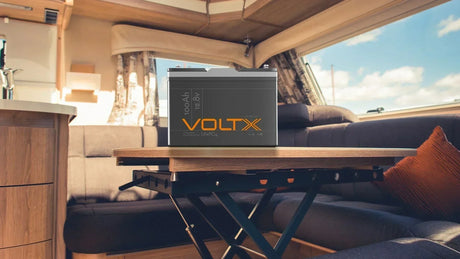In today's power-hungry world, lithium batteries have revolutionised how we store and use energy across countless applications. From powering our everyday devices to enabling off-grid adventures, these energy powerhouses have become indispensable. As a trusted provider of premium power solutions, Outbax is committed to helping you navigate the sometimes complex world of lithium batteries.
This comprehensive guide will walk you through the fundamentals of lithium battery technology, highlight their significant advantages, and provide practical advice for selecting the perfect power solution for your specific requirements.
The Science Behind the Power: How Lithium Batteries Work
Lithium batteries represent a remarkable advancement in energy storage technology, operating on principles fundamentally different from traditional battery systems. At their core, these batteries function through the movement of lithium ions between two electrodes—the anode and cathode—through an electrolyte solution.
During discharge, lithium ions flow from the anode to the cathode, releasing electrons that power your devices; when charging, this process reverses. This electrochemical system allows lithium batteries to store significantly more energy in compact form while maintaining reliable performance characteristics that make them ideal for applications ranging from portable electronics to deep cycle batteries for camping and outdoor adventures.
Why Choose Lithium: Exploring the Key Benefits
The surge in popularity of lithium batteries isn't without reason—these power solutions offer several compelling advantages over conventional battery technologies. Most notably, lithium batteries deliver superior energy density, providing substantially more power while weighing significantly less than equivalently rated lead-acid alternatives. Their impressive cycle life—often exceeding 2,000 complete charge-discharge cycles—translates to years of reliable service compared to just hundreds of cycles from traditional batteries.
Additionally, lithium batteries charge remarkably faster, can safely discharge to greater depths without damage, maintain their charge during storage, and operate efficiently across a wider temperature range. For outdoor enthusiasts and off-grid power users, these benefits translate to lighter packs, longer-lasting power, and greater reliability when you need it most.
Not All Lithium is Created Equal: Understanding the Different Chemistries
Within the lithium battery family, several distinct chemistries exist, each optimised for specific applications. Lithium iron phosphate (LiFePO4) batteries excel in deep cycle applications, offering exceptional safety, thermal stability, and longevity—making them ideal for camping setups. Lithium nickel manganese cobalt oxide (NMC) batteries deliver higher energy density for applications where space and weight are critical constraints.
Lithium nickel cobalt aluminium oxide (NCA) variants provide even greater energy density but with more stringent thermal management requirements. Understanding these differences helps ensure you select the appropriate lithium battery technology that aligns perfectly with your specific power needs and usage scenarios.
Safe and Sound: Essential Lithium Battery Safety Tips
While lithium batteries offer remarkable performance, proper handling and usage are essential for safety and longevity. Always use chargers specifically designed for your lithium battery's chemistry and specifications—using incompatible charging equipment can lead to dangerous failure modes. Avoid exposing your lithium batteries to extreme temperatures, particularly high heat, which can degrade performance and potentially trigger thermal runaway.
Store partially charged batteries (approximately 40-60% capacity) in cool, dry environments when not in use for extended periods. Regularly inspect for signs of physical damage such as swelling, leaking, or deformation, and discontinue use immediately if such indicators appear.
Finding Your Perfect Power Solution: Key Considerations
Selecting the right lithium battery involves careful consideration of several critical factors. Start by assessing your power requirements in amp-hours (Ah) and voltage needs based on your specific applications. Consider the discharge characteristics required for your intended use—will you need sustained power delivery or brief bursts of high current?
Evaluate physical constraints including available space and weight limitations. Outbax offers a comprehensive range of lithium batteries precisely engineered to deliver reliable performance across diverse applications, from weekend camping trips to extended off-grid living situations.
Power Your Life with Confidence: Explore Outbax Lithium Batteries
Understanding lithium battery technology empowers you to make informed decisions about your power needs. With Outbax's range of high-quality lithium solutions, you can embrace portable power with complete confidence, knowing you've selected a reliable, efficient, and long-lasting energy storage solution. Visit our website today or reach out to us for assistance in finding the lithium battery best suited for your power needs.
Frequently Asked Questions
What exactly are lithium batteries and what makes them different from traditional batteries?
Lithium-ion batteries use lithium ions moving between electrodes in an electrolyte solution, unlike traditional lead-acid batteries that rely on chemical reactions between lead plates and sulfuric acid. This fundamental difference allows lithium batteries to be lighter, more energy-dense, and longer-lasting.
Are there different types of lithium batteries, and what are their main applications?
Yes, common types include LiFePO4 (ideal for deep cycle applications like camping), NMC (for higher energy density needs), and NCA (maximum energy density). Each chemistry offers specific advantages for different uses, from powering electronics to supporting off-grid systems.
What are the key benefits of using lithium batteries compared to other battery technologies?
Lithium batteries offer higher energy density, significantly longer lifespan (often 5-10 times more cycles), faster charging, deeper discharge capabilities, lower self-discharge rates, and better performance in varied temperatures.
Are lithium batteries safe to use, and what precautions should I take?
When properly manufactured and used correctly, lithium batteries are very safe. Key precautions include using compatible chargers, avoiding extreme temperatures, inspecting for damage regularly, and storing at partial charge when not in use for extended periods.
How do I choose the right lithium battery for my specific needs?
Consider your power requirements (amp-hours), voltage needs, physical constraints, and intended application. Assess whether you need deep cycle performance, high current delivery, or maximum runtime to determine the optimal lithium battery solution from Outbax's range.





